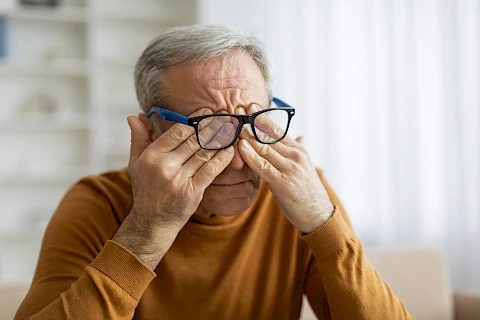
Do you or a loved one suffer from dry, itchy eyes? It's a common problem for seniors, more so than other age groups. Understanding the causes can help manage and treat this annoying issue.
1. Dehydration
Our bodies need water to function properly, and that includes our eyes. Dehydration can reduce the moisture in your eyes, making them dry and uncomfortable. Fortunately, you can reduce symptoms of dehydration by drinking plenty of water and limiting caffeine and alcohol.
2. Age-Related Changes
As we age, our bodies naturally produce fewer tears. Tears are important because they keep our eyes lubricated and comfortable. With age, this decreased tear production can lead to dryness and itchiness.
3. Medications
Many seniors take medications for various health issues. Some of these medications can cause dry eyes. Common culprits include:
- Antihistamines
- Blood pressure medications
- Antidepressants
If you suspect your medication is causing dry eyes, consult your healthcare provider.
4. Environmental Factors
The environment can greatly affect the moisture level in your eyes. Dry air, including using the heater or air conditioning in your home, can dry out your eyes, as can going out in the wind. Use a humidifier in your living space and avoid direct wind exposure to keep your eyes more comfortable.
5. Medical Conditions
Certain medical conditions can also lead to dry eyes. Diabetes, for example, can affect blood vessels in the eyes, reducing tear production. Autoimmune diseases, including conditions like Sjogren's Syndrome, can target and damage the glands that produce tears. If you have any of these conditions, make sure to discuss eye health with your doctor.
6. Contact Lens Use
Wearing contact lenses can make dry eyes worse, especially in seniors. If you are struggling with dry eyes, consider switching to eyeglasses at least part of the time. You can also consider using rewetting drops designed for contact lens users. Talk to your eye doctor for advice on how to manage dry eyes if you wear contacts.
7. Poor Nutrition
What you eat can also affect your eye health. Essential fatty acids and vitamins like Vitamin A play a significant role in maintaining eye moisture. Include more omega-3 fatty acids, which are found in fish, walnuts, and flaxseeds. Strive to eat a balanced diet rich in fruits and vegetables.
Consult with a nutritionist for a meal plan that supports eye health.
8. Computer and Screen Use
Increased screen time can reduce the frequency of blinking, leading to dry eyes. Follow the 20-20-20 rule: Every 20 minutes, look at something 20 feet away for at least 20 seconds. Limit screen time, especially before bed. Taking regular breaks can help reduce eye strain and dryness.
Find Care and Support for Seniors at Home
Dry, itchy eyes are a common issue among seniors, but understanding the causes can help in managing this problem effectively. Whether it's due to dehydration, age-related changes, medications, environmental factors, medical conditions, eyelid problems, contact lens use, poor nutrition, or increased screen time, there are ways to alleviate the discomfort. Remember, it's crucial to consult an eye doctor for a proper diagnosis and treatment plan.
If you need personalized senior care services in Milford, West Haven, Stratford, Fairfield County, or New Haven County, contact Senior Helpers Fairfield. Our home care services can make it easier for seniors to maintain independence and focus on the details that improve their quality of life.